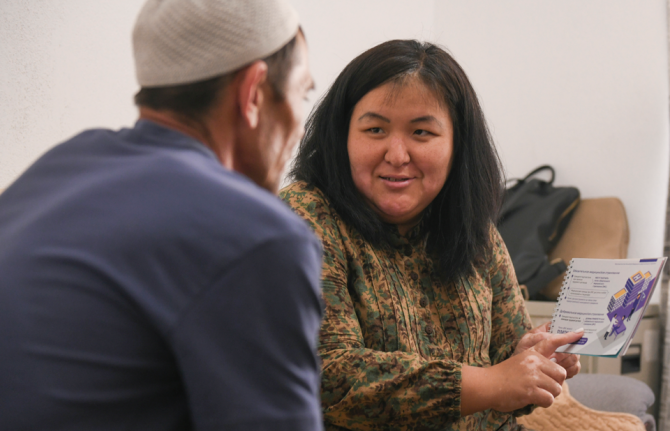
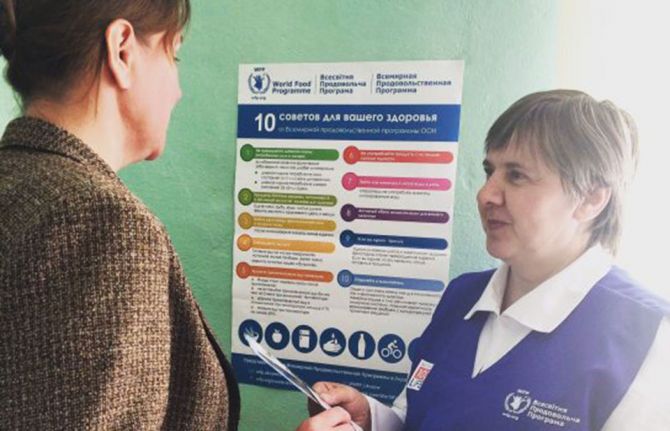
Update
Civil society and WFP increasing food security in Ukraine
20 October 2017
20 October 2017 20 October 2017As for everyone, food security is vital for people living with HIV. Access to food improves adherence to HIV treatment and lack of sufficient food can increase the risk of HIV infection through increased transactional, survival and intergenerational sex. And malnourishment affects how well HIV treatment works—people living with HIV who are malnourished are two to six times more likely to die in the first six months of treatment than those who are not.
For people living with HIV in eastern Ukraine, the conflict has had a significant impact on their food security, with most people living with HIV severely food insecure and living in extreme poverty. The conflict has displaced many people—especially women and children—HIV services have had to be relocated and the quality of services in many facilities is poor.
To prevent the collapse of HIV services and to increase food security for people living with HIV, civil society organizations and the United Nations have stepped in. In the parts of eastern Ukraine not controlled by the government, the United Nations and a few humanitarian organizations are the only entities making antiretroviral therapy and other medicines available.
The World Food Programme (WFP), a UNAIDS Cosponsor, is assisting thousands of people living with HIV in the conflict-affected areas with food support through a programme with the All Ukrainian Network of People Living with HIV, a nongovernmental partner of WFP. In the government controlled areas of Donetsk and Luhansk, 6500 people living with HIV are in a cash-based transfer programme to provide money for essential food. The assistance, which includes regular medical appointments and the monitoring of adherence to HIV treatment, has led to a fourfold decrease in treatment interruptions. In areas of eastern Ukraine not controlled by the government, in-kind food assistance has helped thousands to meet their basic needs.
The need for food support among people living with HIV in eastern Ukraine is, however, far outstripped by the resources available to support them. Although 6500 people living with HIV in Donetsk and Luhansk are accessing cash-based transfers, thousands more are not being assisted, and the need is even greater in the areas beyond government control. There are fears that even this limited help may have to end, since WFP has yet to receive funds to continue the programme in 2018.
Quotes
“Food security is important for everyone, but particularly for people living with HIV. I commend the World Food Programme and civil society for their programme to step up food security for people living with HIV in conflict-affected eastern Ukraine.”
“In eastern Ukraine, the World Food Programme saves lives by providing food assistance to people living with HIV who are impacted by the region’s emergency. If we can raise more money, the World Food Programme can sustain this work and ensure that those who are the most vulnerable are not without help.”
Region/country
Related


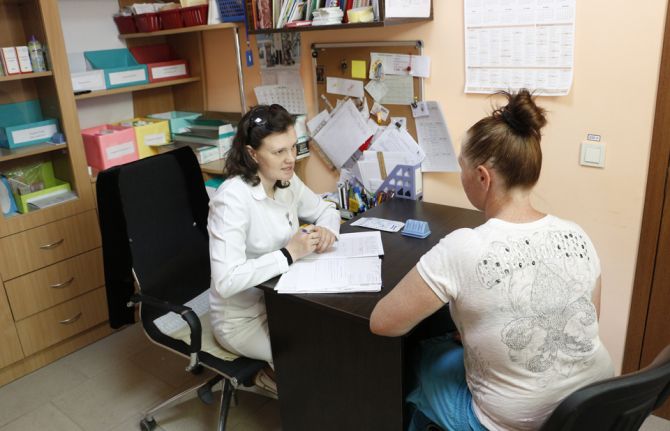
Update
Republic of Moldova to fund HIV prevention services for key populations
19 October 2017
19 October 2017 19 October 2017The Republic of Moldova’s National Health Insurance Fund has announced that it will finance HIV prevention services provided by nongovernmental organizations for two projects for key populations. The services will cover sex workers, gay men and other men who have sex with men and people who inject drugs in Chișinău and Bălți. Approximately US$ 120 000 will be provided to cover an initial one-year period.
The nongovernmental organizations Youth for the Right to Live, which is based in Bălți, and Initiativa Pozitiva, which is based in Chișinău, will implement the projects, which aim to reach around 1000 people who use drugs in Bălți and about 700 people from key populations in Chișinău.
In 2018, four projects will be supported by the National Health Insurance Fund, with a target of 60% of needs to be covered from domestic resources by 2020.
Quotes
“After two decades of financial support for HIV prevention programmes from the Global Fund to Fight AIDS, Tuberculosis and Malaria, we developed a national mechanism for contracting nongovernmental organizations to provide such services using resources from the National Health Insurance Fund. This is the result of advocacy work by many national stakeholders and the full commitment and support of the Ministry of Labour, Health and Social Protection.”
“The success we achieved after over 10 years of advocacy is based on the political will of the Ministry of Labour, Health and Social Protection and the insistence of civil society. We have been involved in all stages. Our aim is to ensure this is a viable mechanism that will be sustainable over the years, so that HIV prevention programmes can continue to save lives.”
“Despite the financial challenges facing the Republic of Moldova, the government is taking a step ahead to walk the walk on funding for harm reduction. This mechanism for government funding is the best way to ensure that harm reduction programmes in the country are effectively implemented and sustained.”
"HIV prevention and reduction of the diseases are the priorities for the National Health Insurance Fund in 2017. We will monitor the projects under our funding to ensure we have a fully operational, efficient and sustainable mechanism established."
Region/country
Related

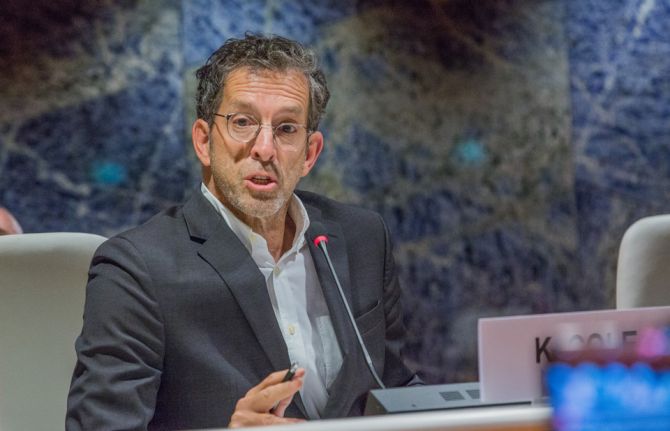
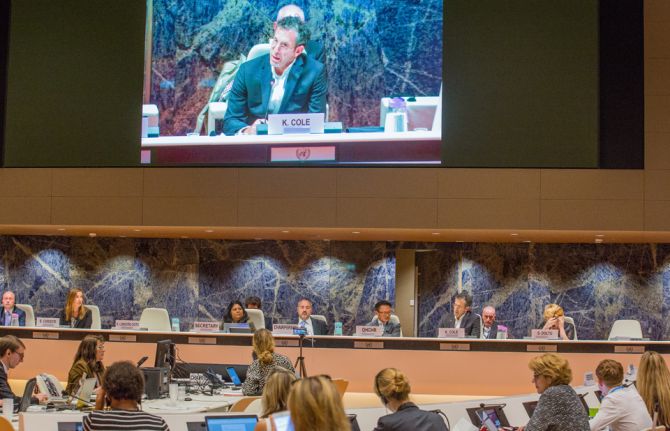
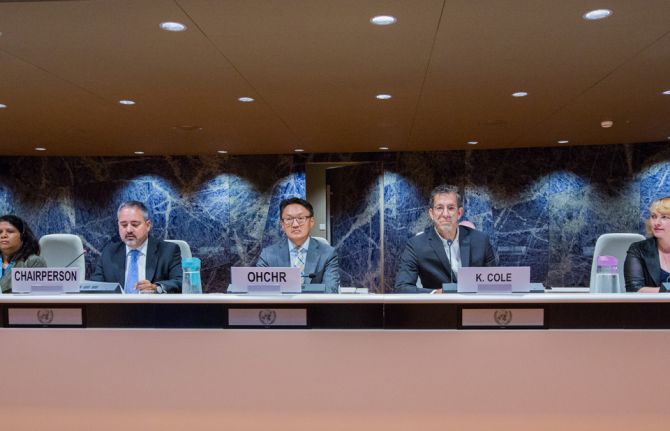
Update
Kenneth Cole: social justice is non-negotiable in the AIDS response
05 October 2017
05 October 2017 05 October 2017UNAIDS International Goodwill Ambassador Kenneth Cole has made a powerful call for social justice in the AIDS response during his intervention at the 2017 Human Rights Council Social Forum, which took place in Geneva, Switzerland, from 3 to 4 October.
“It has been said that stigma has killed more people than the HIV virus,” said Mr Cole. “At its roots, this is about intolerance and discrimination. Social justice is non-negotiable.”
While delivering the keynote address at the session entitled Building Synergies for Health: Engaging Diverse Partners, Mr Cole also underlined that all sectors of society, including the private sector, must act together to end the epidemic.
“I believe that business brings to the table efficiencies, economies and a culture of change,” he said.
The Social Forum is an annual three-day meeting convened by the Human Rights Council. The theme of the 2017 session of the Social Forum is the promotion and protection of human rights in the context of the HIV epidemic and other communicable diseases and epidemics.
Mr Cole spoke at the Social Forum during a three-day visit to Geneva, where he met with the UNAIDS Executive Director, Michel Sidibé, and engaged with UNAIDS staff, civil society activists and staff of other organizations engaged in the response to HIV.
As well as being UNAIDS International Goodwill Ambassador, Mr Cole is also chairman of amfAR and founder of the End AIDS Coalition.
International Goodwill Ambassador
Related

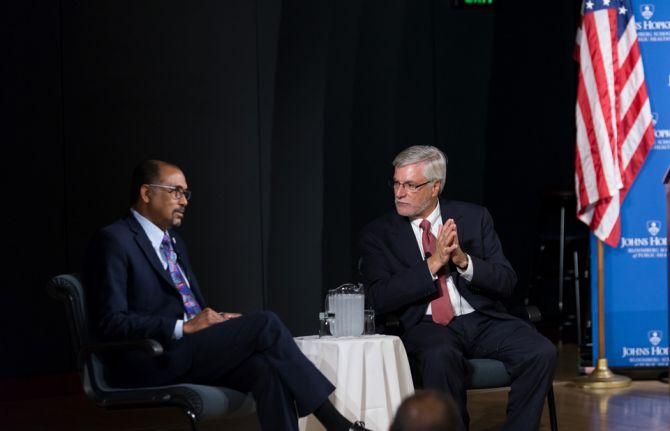
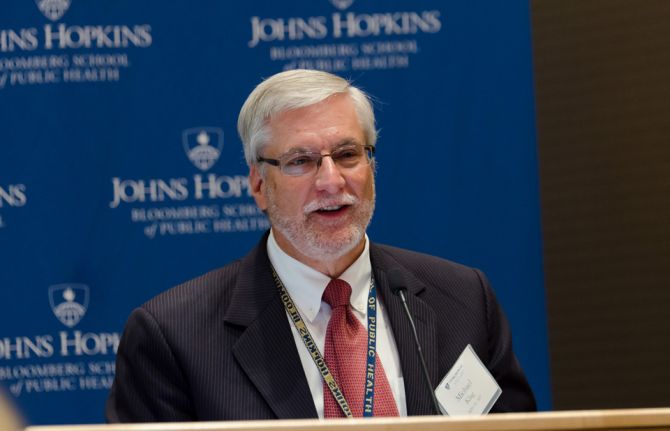
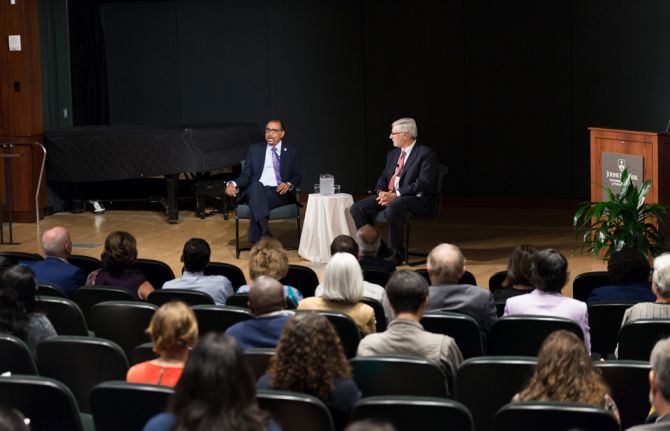
Update
Discussing global health at the Johns Hopkins Bloomberg School of Public Health
15 September 2017
15 September 2017 15 September 2017UNAIDS Executive Director Michel Sidibé met with students and staff during a visit to the Johns Hopkins Bloomberg School of Public Health in Baltimore, United States of America, on 15 September.
During an open dialogue in the school’s Sheldon Hall, Mr Sidibé and the Dean of the school, Michael Klag, joined with students, faculty, researchers, global health leaders and alumni to discuss global health, systems for health, leaving no one behind and social justice. Mr Sidibé expressed his concerns about the fragmented global health system and introduced his vision of systems for health that engage all relevant constituencies, including civil society, governments and scientists, and a global health financing institution that goes beyond HIV, tuberculosis and malaria. In addition, he said, there is an urgent need for an instrument for global health advocacy and accountability.
The visit also saw Mr Sidibé meet with a group of Sommer Scholars to discuss their future contributions to global public health and with members of the Johns Hopkins University Center for AIDS Research.
Quotes
“The future of UNAIDS is being a global health advocacy and accountability organization that integrates HIV with reproductive health and other important health issues. Achieving this will help the organization transform itself and reduce the fragmentation that’s too common in global health.”
Region/country
Related
 Government ensures continuity of treatment in Malawi
Government ensures continuity of treatment in Malawi

10 February 2025

Update
Small island developing states come together to discuss 90–90–90 and beyond
02 October 2017
02 October 2017 02 October 2017The challenges for the AIDS response in small island developing states are unique. Increasingly, they face natural disasters, community displacement and migration. On these small islands, HIV is most prevalent among key populations—sex workers, gay men and other men who have sex with men and people who inject drugs—and most HIV infections are among young people.
In a recent visit to Seychelles, Michel Sidibé, the UNAIDS Executive Director, addressed a meeting on laws, policies and strategies to meet the 90–90–90 targets—whereby, by 2020, 90% of people living with HIV know their HIV status, 90% of people who know their HIV-positive status are accessing treatment and 90% of people on treatment have suppressed viral loads—in small island developing states.
Mr Sidibé highlighted the need for small island developing states to protect the human rights of key populations and to invest in HIV prevention and treatment services for adolescents and young people. He also stressed the importance of improving economic opportunities for communities.
During his visit, Mr Sidibé also addressed the Seychelles National Assembly to stress the importance of ensuring that Seychelles is on the Fast-Track towards ending AIDS. Despite Seychelles’ efforts towards meeting the 90–90–90 targets, new HIV infections among key populations are continuing to grow, highlighting the need to reach populations at higher risk of HIV with effective HIV services.
Mr Sidibé commended the President of Seychelles, Danny Faure, for his bold leadership of the national AIDS response and his commitment to build a generation without AIDS.
Quotes
“The international community should enhance mutual accountability for the shared responsibility of eradicating AIDS. Such a global investment would touch millions living with the HIV who need access to prevention and treatment for life.”
“The UNAIDS Executive Director brings a message of hope. Yes, we will make it to 90–90–90.”
“By getting tested for HIV, we are participating in the solution.”
“I reiterate Kofi Annan’s belief that drugs have destroyed many lives, but also believe that wrong government policies have destroyed many more.”
“We are pleased to welcome a son of Africa, a people-centred person.”
Region/country
Related


Update
Call to break down silos between HIV and cervical cancer prevention
03 October 2017
03 October 2017 03 October 2017The Executive Director of UNAIDS, Michel Sidibé, has highlighted the urgent need to break down silos and integrate HIV and sexual and reproductive health services, including for the prevention and control of cervical cancer, which is an AIDS-defining illness. Mr Sidibé delivered his message at the International Agency for Research on Cancer in Lyon, France, on 3 October.
Leveraging the experience of more than three decades of the AIDS response, Mr Sidibé called for greater mobilization and the breaking down of silos between programmes, movements and services to deliver comprehensive sexual and reproductive health services for women and girls. He also reiterated the need to engage with civil society.
Women living with HIV have an up to five times greater risk of developing cervical cancer, which is the second most common cancer among women living in low- and middle-income countries. Despite cervical cancer being highly preventable with the human papillomavirus vaccine and generally curable with early diagnosis and treatment, more than 528 000 women are diagnosed with it every year and around 266 000 die needlessly, almost 90% of whom live in low- and-middle-income countries.
During his speech, Mr Sidibé highlighted the immense opportunities provided by the Sustainable Development Goals and the 2016 United Nations Political Declaration on Ending AIDS, as well as the resources made available through the Global Fund to Fight AIDS, Tuberculosis and Malaria, which reflect strong global commitment to scaling up integrated services to address coinfections and comorbidities.
Quotes
“It is an unacceptable tragedy that women are dying from cervical cancer because of where they are born, because they are poor and because they do not have access to the life-saving vaccines, diagnostics and treatment available to girls and women in high-income countries.”
“Chronic infections are associated with around one in six cancers worldwide and more than one in three in sub-Saharan Africa. Working collaboratively in a strategic manner across the HIV and cancer fields offers many potential opportunities to reduce the disease burden in some of the world’s most vulnerable populations.”

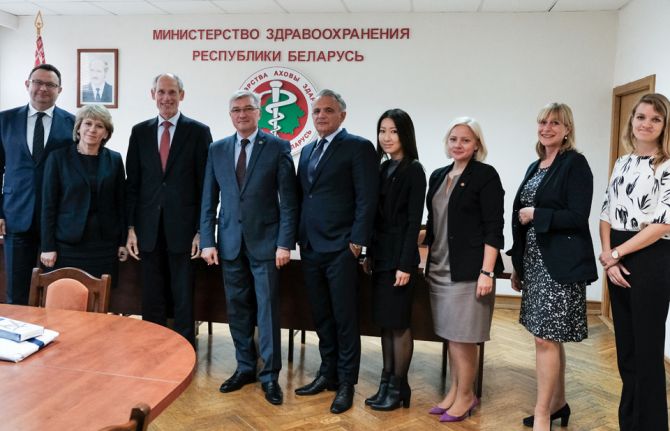
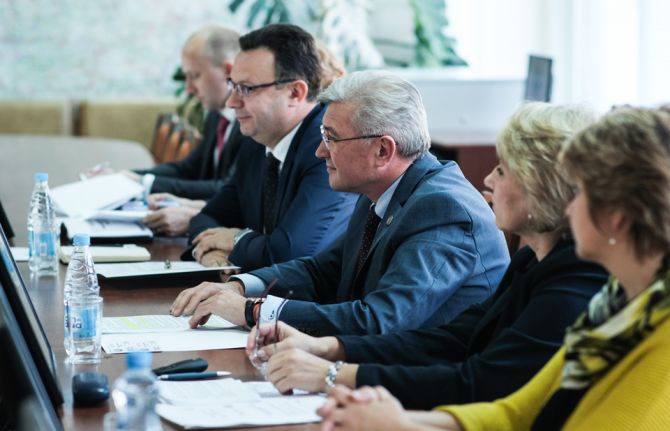
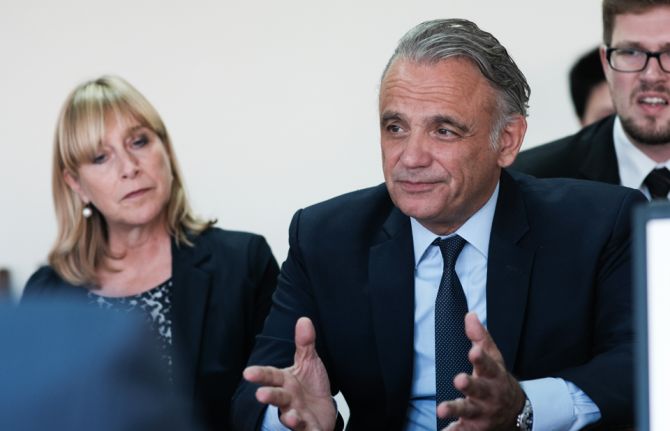
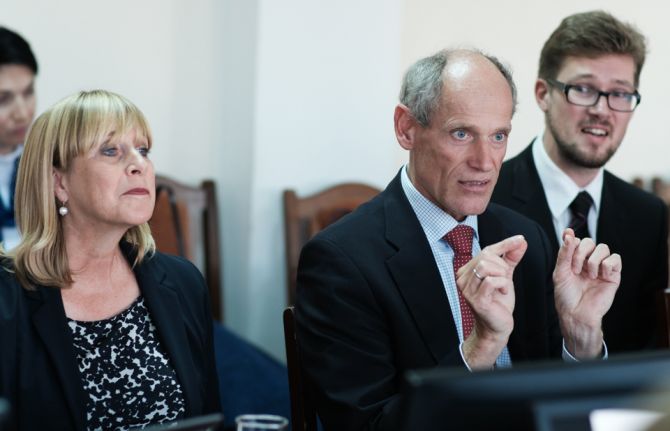
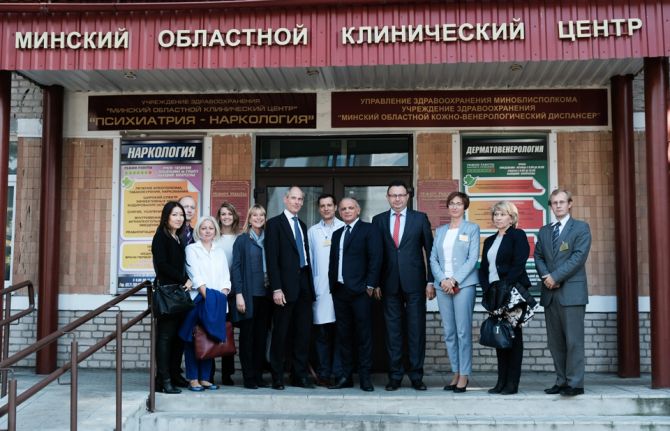
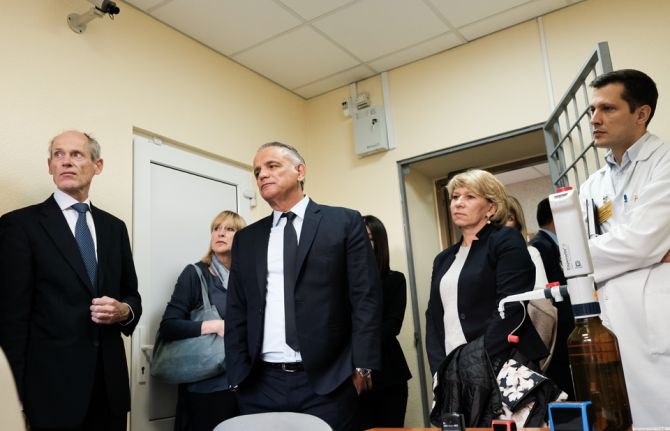
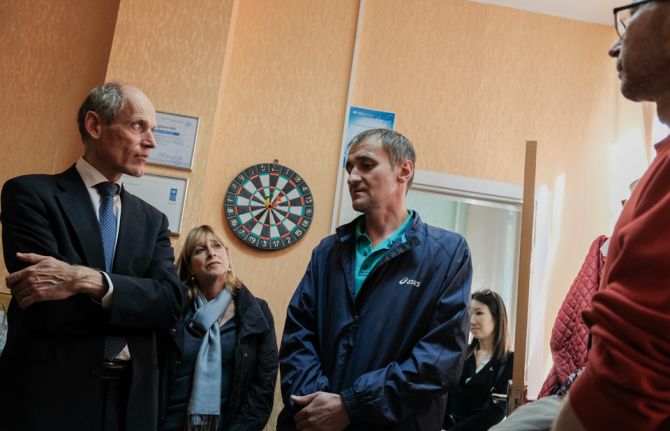


Update
Governments of Belarus and the Netherlands exchange best practices
29 September 2017
29 September 2017 29 September 2017During a two-day visit on 25 and 26 September to Belarus, UNAIDS Deputy Executive Director Luiz Loures and the Ambassador for Sexual and Reproductive Health and Rights & HIV/AIDS of the Netherlands, Lambert Grijns, met with civil society organizations and communities of people who inject drugs, women living with HIV, men who have sex with men and sex workers to hear their perspectives on the current needs and challenges of the AIDS response in the country.
Mr Loures and Mr Grijns also met with the Minister of Health of Belarus, Valery Malashko, and the First Deputy Minister of Health, Dmitry Pinevich, to discuss the HIV epidemic in the region and exchange best practices on the AIDS response in western and eastern Europe, particularly around prevention policy and programme implementation. Potential collaboration between the Netherlands and Belarus was also discussed.
During the meeting, Mr Loures acknowledged the efforts of Belarus in scaling up its AIDS response using domestic resources. The country is on track to achieving the 90–90–90 targets by 2020 and is committed to expanding HIV prevention programmes, including programmes for key populations.
Mr Grijns noted the achievements of Belarus in harm reduction, reducing the cost of antiretroviral treatment and eliminating mother-to-child transmission of HIV. He also commended the close collaboration with civil society and that domestic funds would be provided to nongovernmental organizations, ensuring continuity of community outreach and service delivery.
Quotes
“From a health perspective and as European partners, we need to see what we can do together, focusing on key populations and young people.”
“It is very important to recognize and facilitate best practices in Belarus and for them to be spread to the rest of the region.”
“We have gone a long way to achieving success, but to reach the goals of reducing new HIV infections, reducing AIDS-related deaths and eliminating HIV-related stigma and discrimination by 2020 will take more organizational and resource mobilization efforts. It is our joint task to achieve those targets.”
Region/country
Related
 Women, HIV, and war: a triple burden
Women, HIV, and war: a triple burden

12 September 2025
 Displacement and HIV: doubly vulnerable in Ukraine
Displacement and HIV: doubly vulnerable in Ukraine

11 August 2025

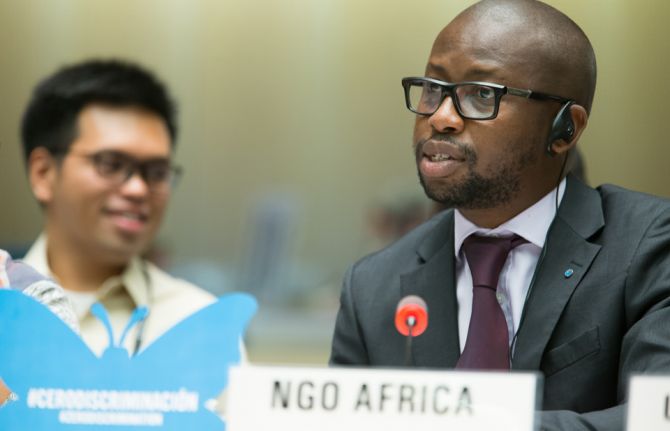
Update
Human rights defenders play a key role in the HIV response
27 September 2017
27 September 2017 27 September 2017While running a legal clinic for refugees 10 years ago, Kene Esom, former Director of African Men for Sexual Health and Rights (AMSHeR), saw how difficult it was for marginalized or vulnerable people to access health-care services. “That is where I realized that as a lawyer and a human rights defender, I could play a role in increasing access to health-care services and defending human rights.” In his more recent role as Strategic Initiatives Adviser to the AMSHeR Board, he is still at the forefront against discrimination, especially discrimination against gay men and other men who have sex with men in Africa.
Mr Esom makes it clear that when he is talking about human rights in the context of HIV, it is not just the right to health that matters. “There is a pattern of human rights violations towards gay men in many countries, owing particularly to the criminalization of consensual same-sex conduct,” said Mr Esom. “For example, when a newspaper decided to publish a sensational story about gay men having a party, the men were arrested. detained and forcibly tested for HIV. All their due process rights were violated and their right to privacy breached to the extent that their names, addresses and pictures were published in the newspaper.”
Mr Esom said that incidents such as this can roll back years of progress in providing HIV services for key populations. “You cannot provide health services without taking into consideration the human rights context of the populations you are providing the services for. You can build the best health-care facility, but gay men will not come to that facility if they are worried that police will arrest them or that doctors will report their sexual behavior.”
Globally, gay men and other men who have sex with men are 24 times more likely to acquire HIV than adults in the general population. Stigma, discrimination, violence and the criminalization of same-sex sexual practices make it more difficult for these men to access HIV prevention, testing and treatment services.
AMSHeR supports human rights organizations to undertake evidence-informed advocacy. “Human rights defenders play a key role in bringing these issues to light and showing the impact that human rights violations can have on HIV responses, especially on services targeting key populations,” said Mr Esom.
Although there is still a lot of silence around issues surrounding sexuality, sexual orientation and gender identity, there is hope. “When I started this work six years ago it was a completely different context. There were very few people who wanted to advocate on these issues. Now, we have a greater pool of people in countries all over Africa and the world, and the communities are standing up for their rights and demanding access to services and a rights-based approach to service delivery.”
In its work, AMSHeR emphasizes the role of communities in advocating for change and speaking directly to policy-makers. “They are the voices and faces of the issues that affect them.”
The right to come together is key. “Many gay men think they are alone. Isolation increases their vulnerability. Bringing people together to discuss their issues creates a community that is empowered to speak up. If that space is not there, engaging policy-makers and service providers becomes more challenging.”
Mr Esom will be speaking about the promotion and protection of human rights in the context of HIV and other communicable disease at the Human Rights Council Social Forum, which is being held from 2 to 4 October. To hear more from Mr Esom and other human rights activists, register to participate at the Human Rights Council Social Forum at https://reg.unog.ch/event/6958/.
Human Rights Council Social Forum
Related






Update
Thailand launches new national strategy to end the AIDS epidemic by 2030
15 September 2017
15 September 2017 15 September 2017The Ministry of Public Health of Thailand has launched its new 2017–2030 National AIDS Strategy, which provides a road map for ending the AIDS epidemic as a public health threat in Thailand by 2030. Narong Pipatanasai, Deputy Prime Minister and Chair of the National AIDS Committee, led the launch at the Government Complex in Bangkok, Thailand, on 13 September.
The 13-year plan adapts the latest global commitments to Thailand, ensuring an effective, cost-efficient and high-impact HIV response. A recent UNAIDS report on the global AIDS epidemic finds that annual new HIV infections dropped by 50% in Thailand between 2010 and 2016, the steepest decline for any country in the Asia and the Pacific region.
During the launch, 19 representatives of ministries and government offices signed a commitment to end AIDS. Deirdre Boyd, United Nations Resident Coordinator for Thailand, congratulated the government on the strategy and Apiwat Kwangkaew, the Vice-Chair of the Thai Network for People Living with HIV, stressed the need to ensure there is no stigma towards people living with HIV, so they can access key services. The Deputy Prime Minister acknowledged that government agencies cannot effectively reach key populations without the support of community groups. He said that while he had not seen important collaboration between key partners in response to other diseases, collaboration was a hallmark of the HIV response.
The strategy’s goal is to further reduce new HIV infections from 6500 to less than 1000, cut AIDS-related deaths from almost 13 000 to under 4000 and reduced HIV-related discrimination in health-care settings by 90% by 2030.
The new strategy commits to a Fast-Track phase, where an all-out effort is made to reach the global 90–90–90 targets by 2020, whereby 90% of people living with HIV know their HIV status, 90% of people who know their HIV-positive status are accessing treatment and 90% of people on treatment are virally suppressed. Thailand has already achieved the first 90.
The country’s epidemic is concentrated among key populations, including men who have sex with men, transgender people, people who inject drugs and sex workers. With the new plan, the government commits to supporting combination prevention programmes for key populations and working in partnership with community-led organizations to reach people at higher risk in the locations where they live and work. The strategy gets to the subnational level, tailoring programmes to specific populations in specific locations. It also plans to increase the integration of HIV health services with hepatitis C, tuberculosis and other infectious diseases.
Quotes
“The government commits to ensuring enough budget for an effective HIV response. I also would like to emphasize that strong partnerships between the government, civil society, the private sector and development partners will ensure that Thailand becomes the first country in Asia to end the AIDS epidemic.”
“We will not reduce new HIV infections if we don’t help key populations understand that they are at risk. We need to make sure people can access key services such as HIV testing, clean needles and syringes and pre-exposure prophylaxis.”
“When Thailand succeeds, it inspires other Association of Southeast Asian Nations member countries to reach new heights. Thailand has a window of opportunity right now to ensure it will reach the end of the AIDS epidemic and encourage other countries to follow its example.”
“Thailand stands out in the Asia and the Pacific region for its achievements in overcoming AIDS. In just one generation the country has gone from having the fastest growing epidemic in Asia to the slowest. This didn’t just happen. It was because of the commitment, resources and innovation that are a hallmark of Thailand’s efforts on HIV.”















